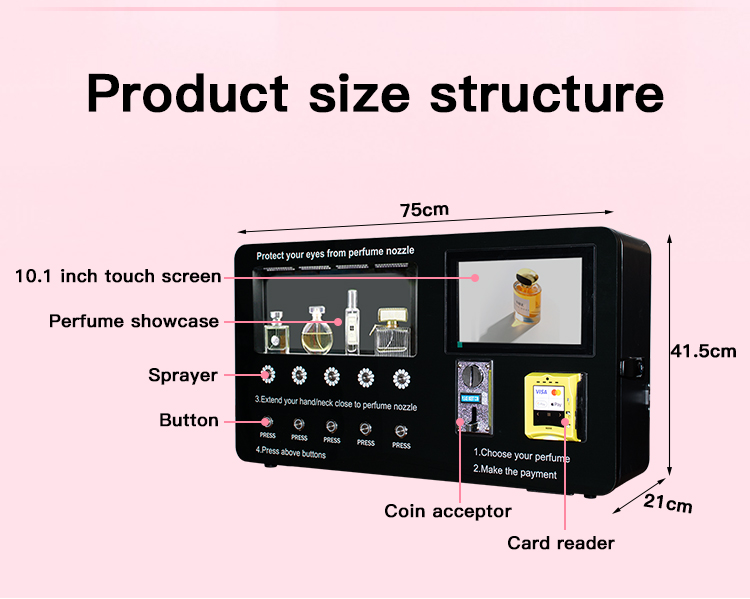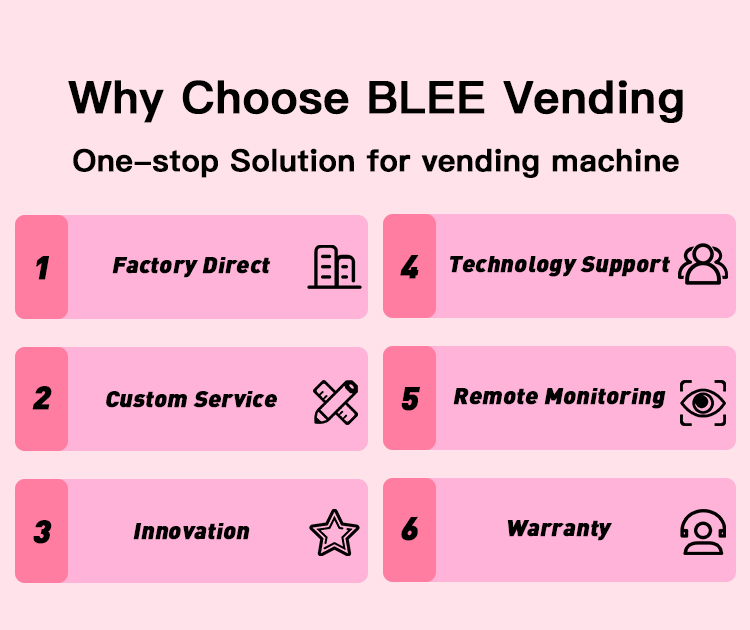In the evolving world of fragrance retail, business owners and consumers alike are asking: should you invest in a perfume vending machine or stick with the time-tested traditional retail model? Both approaches have unique advantages and challenges. This article examines key factors—convenience, cost, customer experience, and data insights—to help you decide which option makes the most sense for your brand or venue.
1. Convenience and Accessibility
Perfume Vending Machine
24/7 Operation: These automated kiosks are always open, allowing customers to sample and purchase fragrances at any hour, perfect for airports, hotel lobbies, and late‐night malls.
Self-Service Speed: With just a few taps on a touchscreen, shoppers browse, spray, and buy in under a minute—ideal for impulse purchases or time-pressed travelers.
Traditional Retail
Fixed Hours: Brick-and-mortar counters operate during staffed hours, typically 9 AM–9 PM, limiting sales opportunities outside peak times.
Personal Assistance: Knowledgeable sales associates can guide customers through scent families, layering techniques, and gift recommendations—an advantage for complex or high-end purchases.
Which Wins?
If your goal is round-the-clock convenience and capturing impulse buys, a perfume vending machine holds the edge. For personalized service and luxury experiences, traditional retail still reigns supreme.
2. Cost and Overhead
Perfume Vending Machine
Lower Staffing Costs: One‐time installation and occasional restocking replace the need for full-time perfume consultants.
Predictable Maintenance: Scheduled refills and remote software updates keep machines running smoothly, with minimal labor expenses.
Machine Investment: Initial purchase and setup can range from $800 to $15,00 per unit, plus inventory.
Traditional Retail
Staff Salaries: Wages, training, and benefits for sales associates contribute significantly to ongoing costs.
Store Rent and Utilities: Premium locations demand high rent; décor, lighting, and displays add extra expenses.
Inventory Management: Centralized stockrooms and manual tracking require additional personnel and systems.
Which Wins?
For lean operations and scalable deployment, a perfume vending machine offers superior cost efficiency. Traditional retail may yield higher sales per customer but carries greater fixed overhead.

3. Customer Experience and Engagement
Perfume Vending Machine
Interactive Interface: High-resolution screens showcase fragrance notes, origin stories, and short tutorial videos.
Hygienic Sampling: Single-use tester cards eliminate cross-contamination concerns.
Limited Guidance: AI-powered recommendations can suggest popular scents, but lack the nuanced expertise of a trained consultant.
Traditional Retail
Expert Consultation: Sales associates provide tailored advice, matching scents to personality, occasion, and season.
Multi-Sense Engagement: Customers can spritz on skin, experience scent evolution over time, and layer multiple fragrances.
Potential Hygiene Drawbacks: Reusable testers pose a risk of cross-handling, requiring strict sanitation protocols.
Which Wins?
If shoppers prioritize quick, hygienic interactions and self-guided exploration, the perfume vending machine shines. For a fully immersive, consultative purchase journey, nothing beats a staffed perfume counter.

4. Data Analytics and Inventory Control
Perfume Vending Machine
Real-Time Insights: Every sample and sale is logged, revealing top-selling fragrances, peak usage times, and customer preferences.
Automated Alerts: Instant notifications when stock runs low or when machine errors occur.
Scalable Reporting: Easily compare performance across multiple locations or time periods.
Traditional Retail
Manual Tracking: Sales associates record transactions and customer feedback, often in separate point-of-sale and CRM systems.
Delayed Reporting: End-of-day or weekly summaries may miss real-time trends.
Human Error: Stock counts and sales attribution can be prone to mistakes without rigorous controls.
Which Wins?
For robust, up-to-the-minute data that drives smarter merchandising decisions, the perfume vending machine is the clear victor. Traditional retail insights depend heavily on manual processes.
Conclusion
Choosing between a perfume vending machine and traditional retail comes down to your business priorities:
Go with a Perfume Vending Machine if you value 24/7 accessibility, lean staffing, hygienic sampling, and data-driven inventory management.
Stick with Traditional Retail if personalized consultation, rich sensory experiences, and luxury ambiance are your top selling points.
By weighing convenience against personalization and overhead against engagement, you can select the retail model that best aligns with your brand vision and customer expectations in 2025 and beyond.


